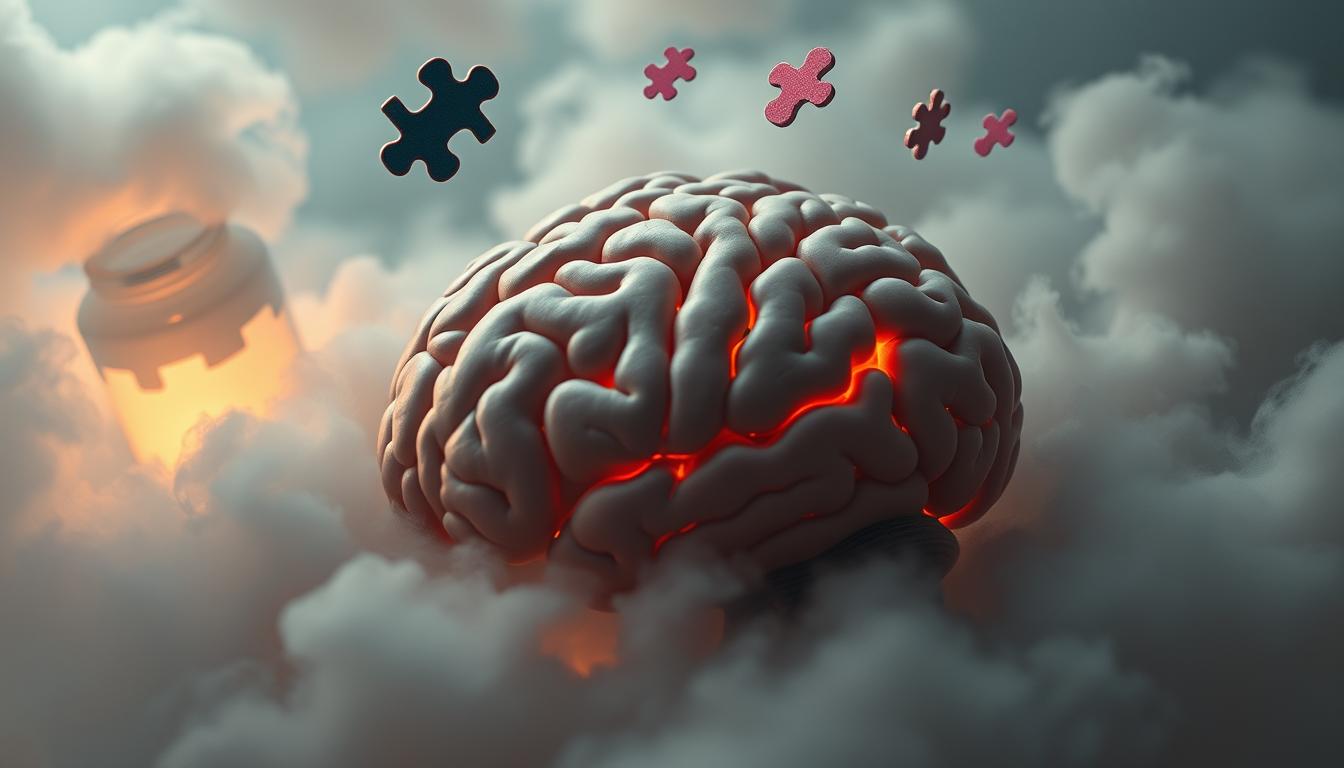Gabapentin and Memory Loss: What You Need to Know

Gabapentin is a medication used for nerve pain and seizures. It’s also used for other conditions. But, there’s a growing concern about gabapentin and memory loss.
Studies with over 206,000 people have found links between gabapentin and dementia.

We will look into how gabapentin affects memory. We’ll also talk about what factors might influence these effects.
This will give you a full picture of gabapentin’s impact on memory.
Table of Contents
- Understanding Gabapentin
- Potential Uses of Gabapentin
- Memory Loss with Gabapentin
- Does Gabapentin Cause Memory Loss?
- Factors That Influence Memory Loss
- Gabapentin and Brain Fog
- Gabapentin Addiction and Memory Impairment
- Safe Use of Gabapentin
- Alternatives to Gabapentin for Pain Management
- Patient Testimonials
- Conclusion
Understanding Gabapentin
Gabapentin is a common medication used to manage certain neurological conditions.
It works by mimicking gamma-aminobutyric acid (GABA), a key neurotransmitter. This helps control seizures and nerve pain, especially after shingles.
It’s not just for epilepsy; gabapentin also treats nerve pain. This shows its wide range of uses in medicine.
Gabapentin was first used for epilepsy, focusing on partial seizures. Now, it helps with other conditions like postherpetic neuralgia.
This pain happens after shingles and is hard to treat.
Gabapentin is popular because it works well on complex pain. It’s a key part of pain management.
How Gabapentin Works in the Brain
Gabapentin works in the brain by boosting GABA’s effects. This calms down nerve activity.
It does this by binding to calcium channels, reducing calcium flow and neurotransmitter release.
Discover Your Path to a Longer, Healthier Life!
Take our free quiz to see how your lifestyle measures up to the world's longest-living communities and receive expert tips for a healthier, longer life.
Take the QuizThis helps with conditions caused by too much nerve activity. It can reduce anxiety and discomfort. But, it’s important to know about its effects on the brain, especially with long-term use.
| Key Characteristics | Description |
|---|---|
| Classification | GABA analog |
| Primary Uses | Seizures, neuropathic pain, postherpetic neuralgia |
| Mechanism of Action | Reduces neuronal excitability in the central nervous system |
| Interaction with Calcium Channels | Binds to calcium channels to reduce neurotransmitter release |
| Cognitive Considerations | Potential cognitive effects with long-term use |
Potential Uses of Gabapentin
Gabapentin is known for its many uses. It helps manage seizures and relieve nerve pain. This makes it very useful in medical care.
Treatment for Seizures
Gabapentin is often used to help with partial seizures. It helps keep neurons stable. This is key in managing seizures.
It works by increasing GABA in the brain. This calms down neurons. It helps reduce how often seizures happen.
Managing Nerve Pain
Gabapentin also helps with nerve pain. It’s good for diabetic nerve pain and post-herpetic neuralgia. It stops pain from traveling through nerves.
People with chronic pain find it helpful. It improves their life quality by easing pain.
| Condition | Gabapentin Use | Efficacy |
|---|---|---|
| Partial Seizures | Adjunctive therapy | Effective in reducing seizure frequency |
| Diabetic Peripheral Neuropathy | Nerve pain relief | Helps decrease pain sensations |
| Post-Herpetic Neuralgia | Nerve pain relief | Provides significant pain management |
Memory Loss with Gabapentin
Research on gabapentin and its effects on memory is ongoing.
Studies have shown that gabapentin can impact memory differently, especially when used with other medications. The results vary widely.
Research Findings on Gabapentin and Cognitive Effects
A meta-analysis looked at 21 studies on gabapentin’s memory effects. It found that memory changes depend on the dose and when it’s taken.
Pregabalin, a similar drug, caused side effects in healthy people, but gabapentin’s effects were different in various studies.
Studies with healthy animals showed gabapentin could improve memory, depending on when it was given. But, human studies didn’t clearly show it helps memory. Over 1% of users reported memory problems, showing potential risks.
Individual Experiences and Anecdotal Evidence
People taking gabapentin share their experiences. Many feel brain fog, not just memory loss. They worry about cognitive decline and confusion, especially with long-term use.
These personal stories are crucial because measuring cognitive side effects is hard. They show the need for more research. Understanding these experiences helps us talk about gabapentin’s cognitive effects.
| Study Type | Total Articles | Focus on Memory | Dosage Impact |
|---|---|---|---|
| Clinical | 4 | Yes | Key factor |
| Preclinical | 17 | Yes | Key factor |
| Total | 21 | Yes | Key factor |
Does Gabapentin Cause Memory Loss?
Looking into whether gabapentin causes memory loss is complex.
Studies show gabapentin, when used correctly, usually doesn’t harm memory.
Lifespan Comparison Tool
Compare the life expectancy by the U.S. State
But, mixing gabapentin with other drugs, like baclofen, might raise the risk of memory problems. More research is needed to fully understand gabapentin’s impact on memory.
Link Between Gabapentin and Cognitive Decline
A study on gabapentin’s effects in patients with epilepsy found mixed results.
Gabapentin’s effects on the mind were different from other drugs like carbamazepine. Side effects like memory loss, dizziness, and trouble speaking were reported.
Several factors make the gabapentin and memory loss link tricky:
- Individual Sensitivity: People react differently to gabapentin.
- Combining Medications: Mixing gabapentin with other drugs can worsen memory issues.
- Dosage Variability: Taking more gabapentin increases the risk of memory problems.
- Duration of Use: Long-term use of gabapentin can affect memory over time.
The risk of dementia might be higher for those taking many drugs at once. It’s crucial for doctors to review all medications to manage gabapentin’s risks.
| Factor | Impact on Memory |
|---|---|
| Individual Sensitivity | Varies; some may experience significant memory issues |
| Combining Medications | Increases the potential for cognitive decline |
| Dosage | Higher doses often correlate with memory loss |
| Duration of Use | Prolonged usage may lead to worsened cognitive outcomes |
Factors That Influence Memory Loss
Memory loss can come from many sources, like how different medicines work together.
It’s important to know these factors to understand the risks of taking gabapentin for a long time. This part talks about how taking gabapentin with other medicines and the dose can affect memory.
The Role of Combined Medications
When gabapentin is taken with other medicines that slow down the brain, the risk of memory problems goes up.
These medicines include:
- Benzodiazepines
- Anticholinergic drugs
- Sedative-hypnotics
- Narcotic painkillers
These medicines can make thinking and memory worse, especially in older people.
Taking many medicines at once, or polypharmacy, can really hurt thinking skills.
A study in Taiwan showed that people taking gabapentin with other medicines were more likely to get dementia.
Impact of Dosage and Duration of Use
The dose and how long you take gabapentin also matter for your brain health.
Taking more gabapentin for a longer time can make thinking harder. Important things to think about include:
| Duration (Months) | Dosage Range (mg/day) | Potential Memory Impact |
|---|---|---|
| 1-6 | 300-600 | Minimal impact observed |
| 6-12 | 600-1200 | Possible increase in drowsiness |
| 12+ | 1200+ | Higher risk of cognitive deficits |
Using gabapentin for a long time, especially with other medicines, can hurt thinking skills. It’s key to watch and adjust medicine use to avoid memory problems.
Gabapentin and Brain Fog
Gabapentin is often used to treat different health issues. Yet, many people taking it experience brain fog.
This can make them feel confused, have trouble focusing, and forget things easily.
Knowing the signs of brain fog can help patients talk about it with their doctors.
Understanding Brain Fog Symptoms
- Confusion and disorientation
- Difficulty focusing on tasks
- Forgetfulness in daily activities
- Challenges in processing information
These symptoms show how gabapentin can affect the brain.
Brain fog can really change someone’s life, making it important to understand why it happens.
Possible Neurochemical Mechanisms
Gabapentin’s link to brain fog comes from how it works in the brain. It changes how GABA works, which is key for brain activity.
It also affects glutamate, a key player in learning and memory.
If gabapentin makes the brain too calm, it can mess with thinking and memory, leading to brain fog.
Gabapentin Addiction and Memory Impairment
Gabapentin was first made to help with seizures. Now, it’s known for its potential for abuse.
People looking for a sedative effect, like opioids or benzodiazepines, are misusing it. This growing addiction problem worries experts about its effects on memory and brain function.
Potential for Abuse and Dependency
Using gabapentin without a doctor’s order can lead to addiction.
People might mix it with other drugs to get a stronger effect. This increases the chance of a substance use disorder.
Signs of addiction include withdrawal symptoms like anxiety and seizures when stopping the drug. It’s important to spot these signs early to help.
Long-term Consequences of Misuse
Long-term use of gabapentin can harm memory.
Users often struggle to remember things and recall events. Those who use it for a long time might face serious health issues, like breathing problems.
It’s key to follow the doctor’s advice to avoid these dangers.
| Aspect | Potential Impact |
|---|---|
| Drug Dependency | Increased reliance on gabapentin leading to withdrawal symptoms |
| Memory Impairment | Cognitive decline affecting recall and retention of information |
| Abuse Risk | Higher likelihood of misuse when combined with other substances |
| Withdrawal Effects | Symptoms include anxiety, seizures, confusion, and restlessness |
| Long-Term Neurological Risks | Potential for severe consequences including respiratory depression |
Safe Use of Gabapentin
Talking to healthcare providers is key when using gabapentin safely.
Open talks help patients grasp the drug’s cognitive effects. A healthcare consultation can guide the best treatment plan, considering health conditions and other medications.
Consulting with Healthcare Providers
It’s crucial for patients to discuss their health with doctors. These talks help decide if gabapentin is right for them. They ensure patients know the risks and benefits, leading to safer treatment.
Understanding Dosage Guidelines
It’s important to follow the right dosage of gabapentin.
Patients should stick to their doctor’s prescription to avoid side effects.
Regular checks on how well the treatment is working help keep gabapentin safe. Knowing these guidelines helps patients manage their health effectively.
Alternatives to Gabapentin for Pain Management
Looking for ways to manage nerve pain or other conditions?
There are many gabapentin alternatives. These options work differently and might not cause the same brain fog as gabapentin.
They can help you manage pain better while keeping you feeling good.
Non-pharmacological Options
There are many non-drug ways to feel better without gabapentin’s side effects. Here are some:
- Physical Therapy: It can make you stronger, more flexible, and improve how you move.
- Cognitive Behavioral Therapy: It helps change how you think about pain and your feelings.
- Yoga and Mindfulness: These practices can help you relax and focus your mind, easing pain and stress.
- Acupuncture: It’s an old method that might help by improving energy flow and reducing swelling.
- Massage Therapy: It can help relax muscles and improve blood flow.
Other Medications to Consider
There are other drugs that can help with pain, each with its own side effects. Here are a few:
| Medication | Use | Typical Dose | Common Side Effects |
|---|---|---|---|
| Pregabalin (Lyrica) | Nerve pain, anxiety | 150-600 mg daily | Tiredness, dry mouth, dizziness |
| Amitriptyline (Elavil) | Neuropathic pain, migraines | 10-25 mg daily | Nausea, dry mouth, constipation |
| Carbamazepine (Carbatrol) | Epilepsy, neuralgia | 200 mg twice daily | Dizziness, constipation |
| Phenytoin (Epanutin) | Seizures, neuralgia | 200-500 mg daily | Nausea, dizziness, constipation |
| Duloxetine (Cymbalta) | Diabetic neuropathy, fibromyalgia | 60 mg daily | Heartburn, dry mouth, vomiting |
Patient Testimonials
Learning about gabapentin from patients offers insights into its effects on memory and thinking. Many have shared their experiences, both good and bad.
This section will look at real-life stories and advice from doctors.
Real-Life Experiences with Memory Loss
Many patients say gabapentin affects their memory. They talk about feeling foggy, having trouble focusing, and forgetting things easily.
These stories show how gabapentin can affect people differently.
One person said, “I had trouble remembering everyday things, which was really hard.” Another said memory problems made their job harder, worrying about how it would affect their life.
Advice from Healthcare Professionals
Doctors stress the need to watch for changes in thinking when taking gabapentin.
They suggest talking openly about any memory issues. This can help adjust treatment plans to meet individual needs.
A well-known neurologist said, “Reporting symptoms right away is key to finding the right treatment.” Following doctor’s advice on taking medication is important to avoid side effects, like memory problems.
| Rating Category | 5 Stars | 4 Stars | 3 Stars | 2 Stars | 1 Star |
|---|---|---|---|---|---|
| Effectiveness | 498 | 427 | 370 | 239 | 359 |
| Ease of Use | 937 | 439 | 273 | 89 | 155 |
| Satisfaction | 504 | 312 | 312 | 237 | 528 |
Conclusion
Gabapentin is important for managing seizures and pain.
But, new studies show it might affect our memory. People taking gabapentin might have a higher chance of getting dementia.
This makes us think about the drug’s long-term use.
We need to weigh its benefits against the risks to our brain. It’s crucial to find a balance.
If you’re taking gabapentin, watch out for any changes in your thinking.
Talk to your doctor about your concerns. They might adjust your dose or suggest other treatments.
More research is needed to understand gabapentin’s effects on our brain.
This will help us make better choices. It’s important for both patients and doctors to stay informed.
Knowing about gabapentin’s effects can help us use it wisely.
It’s all about making smart choices. This way, we can get the most benefits while avoiding risks.

 972-393-1699
972-393-1699







